
Edward Humes – Our Dirty Love Affair with Trash. Have you ever thought about how much trash you create? Honestly, have you ever stopped to consider how many trash bags you go through, how many trips to the curb you take, or how much food you throw out? Probably not…most of us don’t. But the sad truth is the average American produces 102 tons of garbage across a lifetime and $50 billion in squandered riches are rolled to the curb each year! Although we have become extremely efficient with keeping trash out of site, unfortunately that has kept it out of mind, and it’s creating a massive problem. This week we speak with Pulitzer Prize-Winning author, Edward Humes about trash – what’s in it, how much we pay for it, how we create so much, what’s wrong with it all and how we fix it. Edward’s amazing book, Garbology: Our Dirty Love Affair with Trash, is raising awareness of trash consumption and is sparking nationwide action.
Edward Humes is a Pulitzer Prize-winning journalist and non-fiction writer. He received the Pulitzer Prize for specialized reporting for investingative stories he wrote about the US military for the Orange County Register. He is the author of 13 nonfiction books, and a contributing writer for Sierra Magazine, California Lawyer and Los Angeles magazine, among other publications. He is married to journalist and author Donna Wares and lives in Southern California.
“There is a reason we call it waste – you are throwing stuff away that has value. You are wasting it.”
– Edward Humes
Quotes from Edward:
[shadowbox]”Garbage mountain in Los Angeles makes so much methane that the power plant on top of it generates enough electricity for 50,000 homes.”
“Waste is an embedded problem in pretty much every difficult challenge we now face, from climate to energy to our economy.”
“Landfills are one of the chief sources of methane in the atmosphere, right after the petroleum industry.”
“There is a great return on investment for being sustainable, particularly if you focus on reducing waste.”
“Organic waste (food) causes the most greenhouse gas emissions when it ends up in a landfill.”[/shadowbox]
What we learn in this episode:
- Why did Walmart choose to make reducing waste a top priority throughout the company and what were the effects?
- Germany and Austria send only 1% of the their trash to landfills, while America sends nearly 70%!
- What happened when MIT students place tracking devices in random articles of trash throughout Seattle? The results are shocking.
- What is the story of our garbage? Where does it come from and where does it go?
Resources:
Garbology: Our Dirty Love Affair with Trash
https://www.facebook.com/Garbology
—
This episode is brought to you by:
 Igloo: Go to igloosoftware.com/smartpeople to use Igloo for free with up to 10 of your favorite coworkers or customers!
Igloo: Go to igloosoftware.com/smartpeople to use Igloo for free with up to 10 of your favorite coworkers or customers!
 Future Advisor: Let new technology give you complete clarity on all of your investments and a plan to meet your goals sooner – Go to www.futureadvisor.com/smartpeople for your 3 month free premium portfolio management.
Future Advisor: Let new technology give you complete clarity on all of your investments and a plan to meet your goals sooner – Go to www.futureadvisor.com/smartpeople for your 3 month free premium portfolio management.
Thanks for this great episode. I’ve lived in Germany for five years now and was very proud to hear your statistic quoted about less than 1% of trash reaching the landfill here. Being mindful about the waste I produce, and what I do with that waste, is so ingrained in my everyday life here that now I find it simply astonishing what is happening in the U.S. with trash.
To start, in Germany there is not nearly the amount of packaging that you find in the U.S., and when you go shopping, you typically bring your own small cloth shopping bags to hold stuff (if you want a plastic bag, they typically make you pay for it). Trash is sorted into four areas/bins: Paper recycling, plastic type stuff, bio degradable (food, plants, etc.), and then, with what’s left, a very small amount of actual “trash.” You very rarely ever see or use paper plates or plastic cups and utensils, for example, or Styrofoam “to go” boxes.
Most bottles (glass or plastic) have a deposit included in the price when you buy the product. You return those bottles to a grocery or drink store to have your deposit returned (typically in the form of machines that scan the code). Some of those bottles are crushed and recycled, and some (like some beer bottles, glass juice bottles, or hard plastic water or Coke bottles) are simply sterilized and reused. It’s typical to drink a soda or beer with a little wear on the bottle. 😉 Bottles that don’t have a deposit are simply recycled, such as in glass recycle containers located liberally in all neighborhoods.
This means in my personal sphere I do an awful lot of trash sorting in my tiny 380 sq. ft. apartment. It means I have to haul my trash around with me sometimes (to return bottles for the deposit). But it’s so ingrained in the mindset here that it just becomes part of your everyday life. It’s not hard, and it makes me feel responsible. Sure, sometimes Germans laugh at all the trash sorting/rules around that and the facilities that manage it all, and sometimes they grumble when a local government builds an expensive recycling facility that will ultimately raise taxes. Sometimes I smile a little ruefully when I consider the great pains people take with their trash here compared to the “consumption/waste” mentality of the U.S. I wish the U.S. would have a little imagination and look at how other countries do this, and also open their minds to solutions. For example, it’s not going to hurt anyone to pay a deposit on the bottle and take the trouble to return it to a store to get your money back.
Pingback: Media Mining Digest 194 – July 31, 2015: 3D Manufacturing, Ad